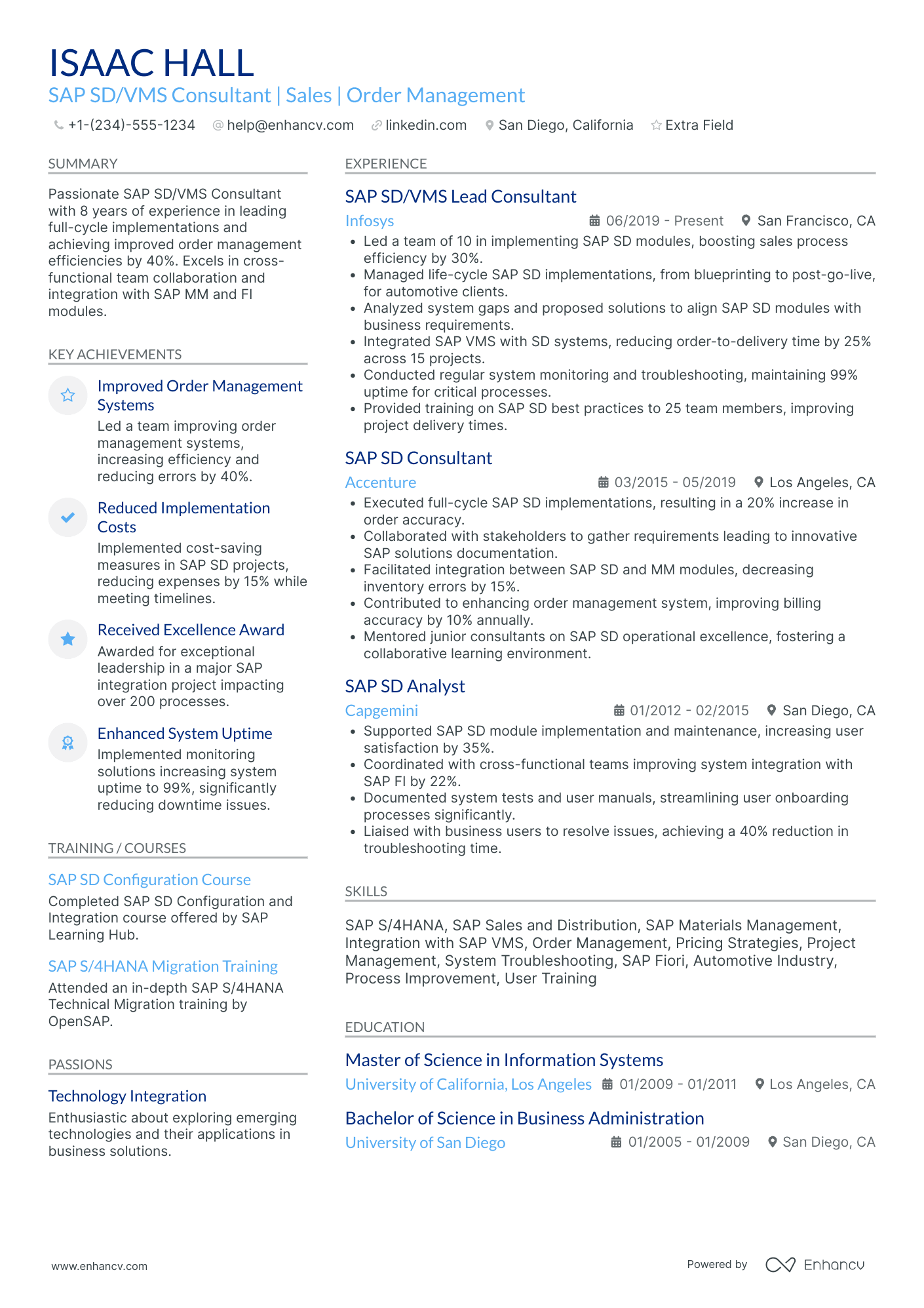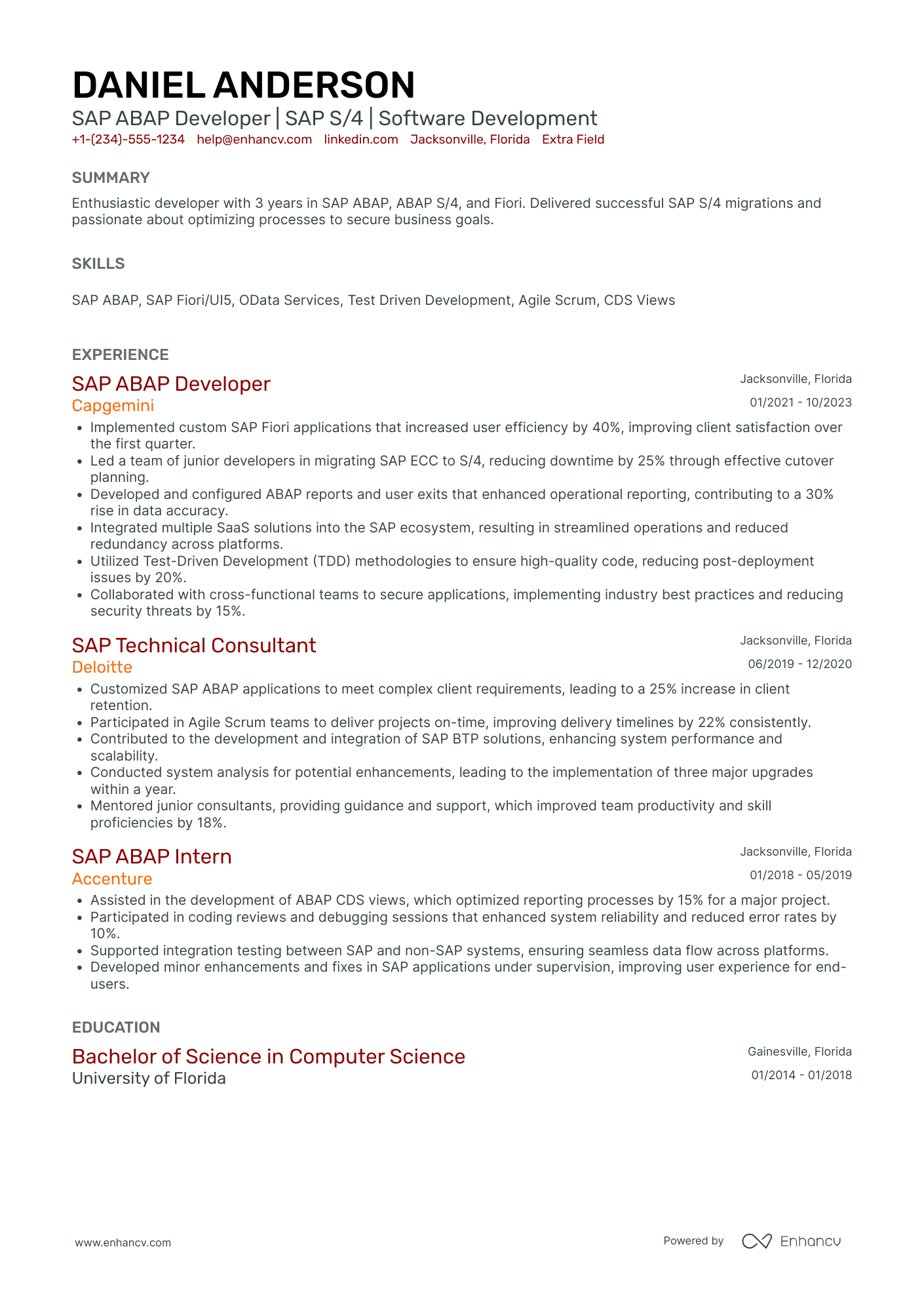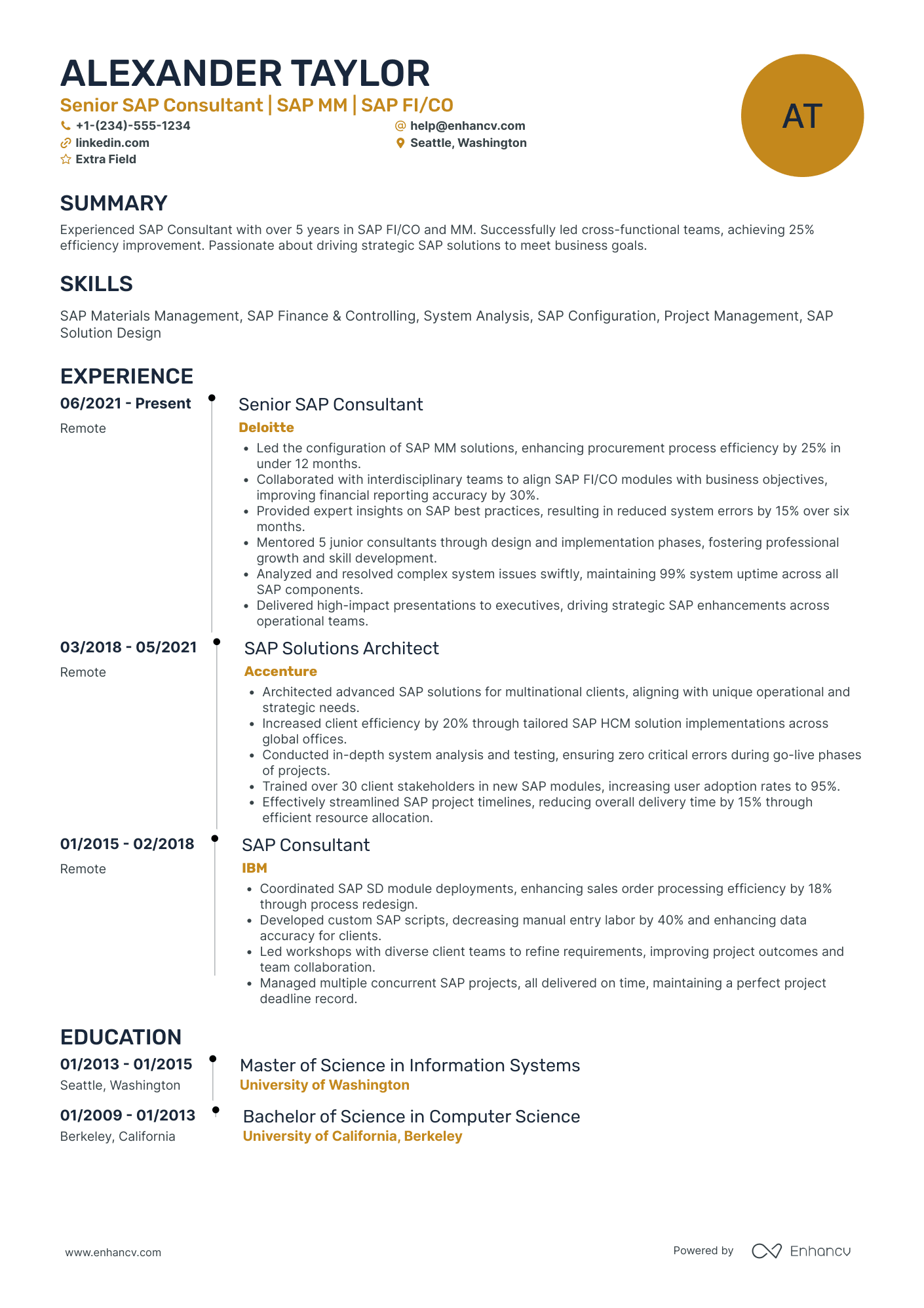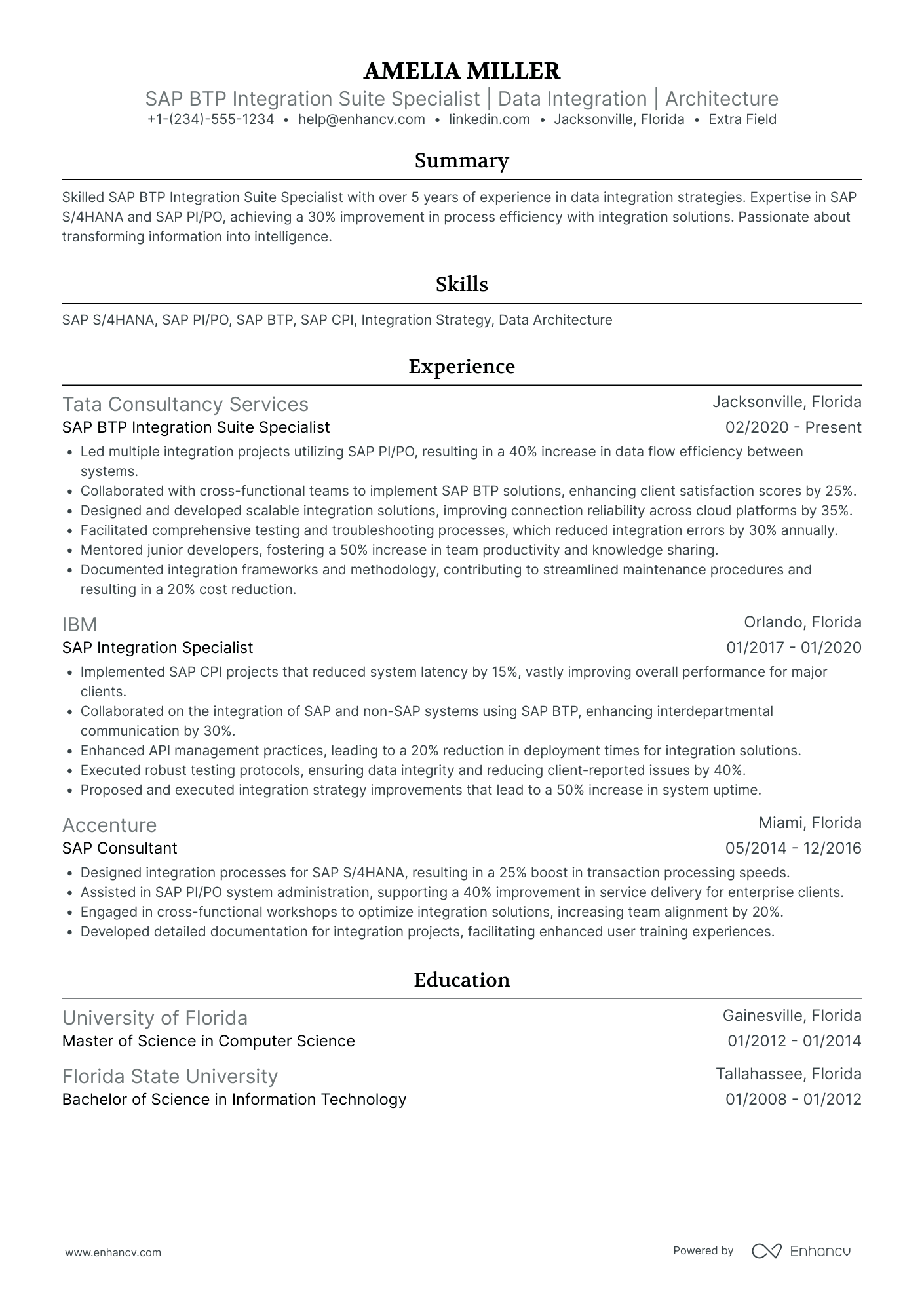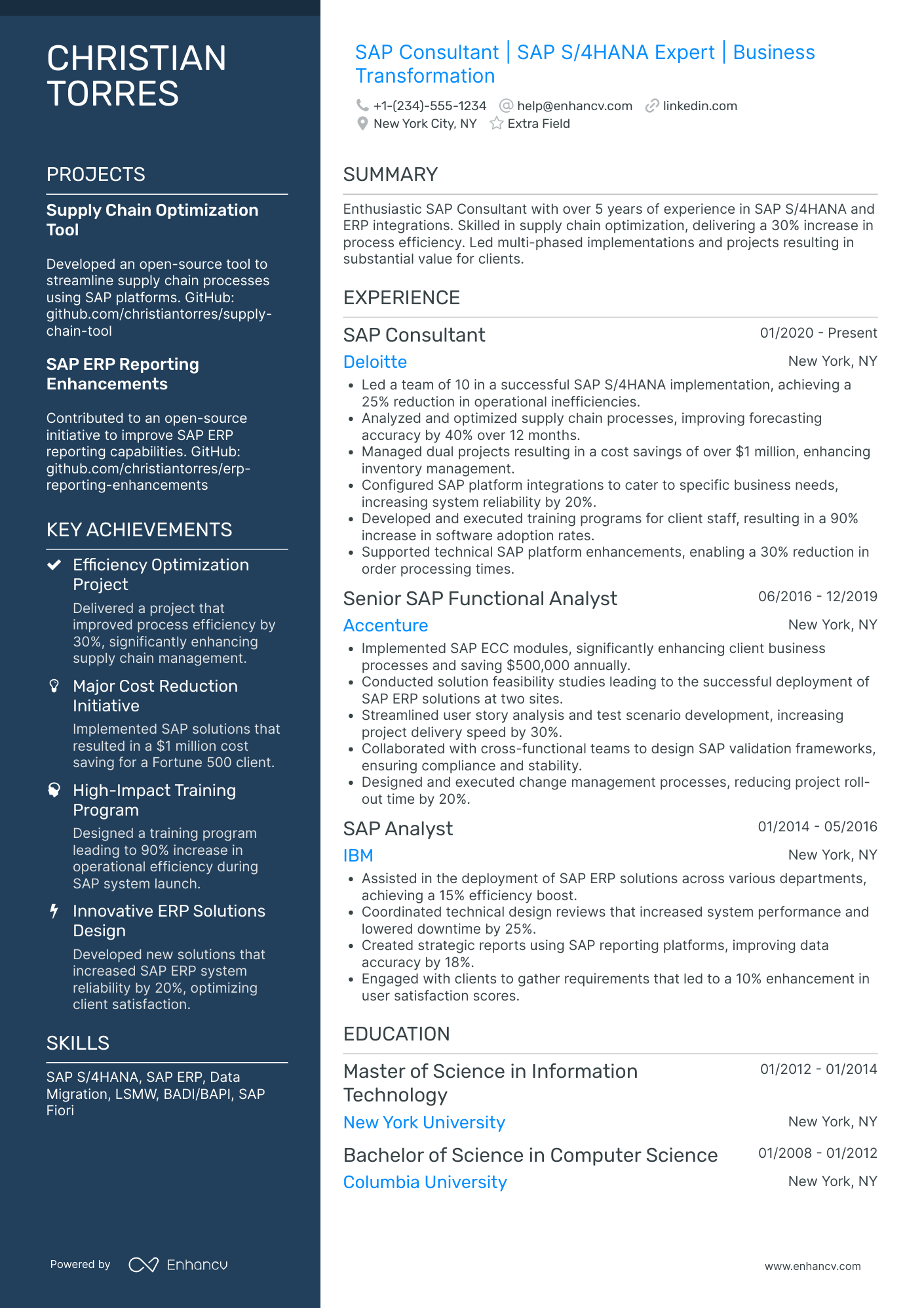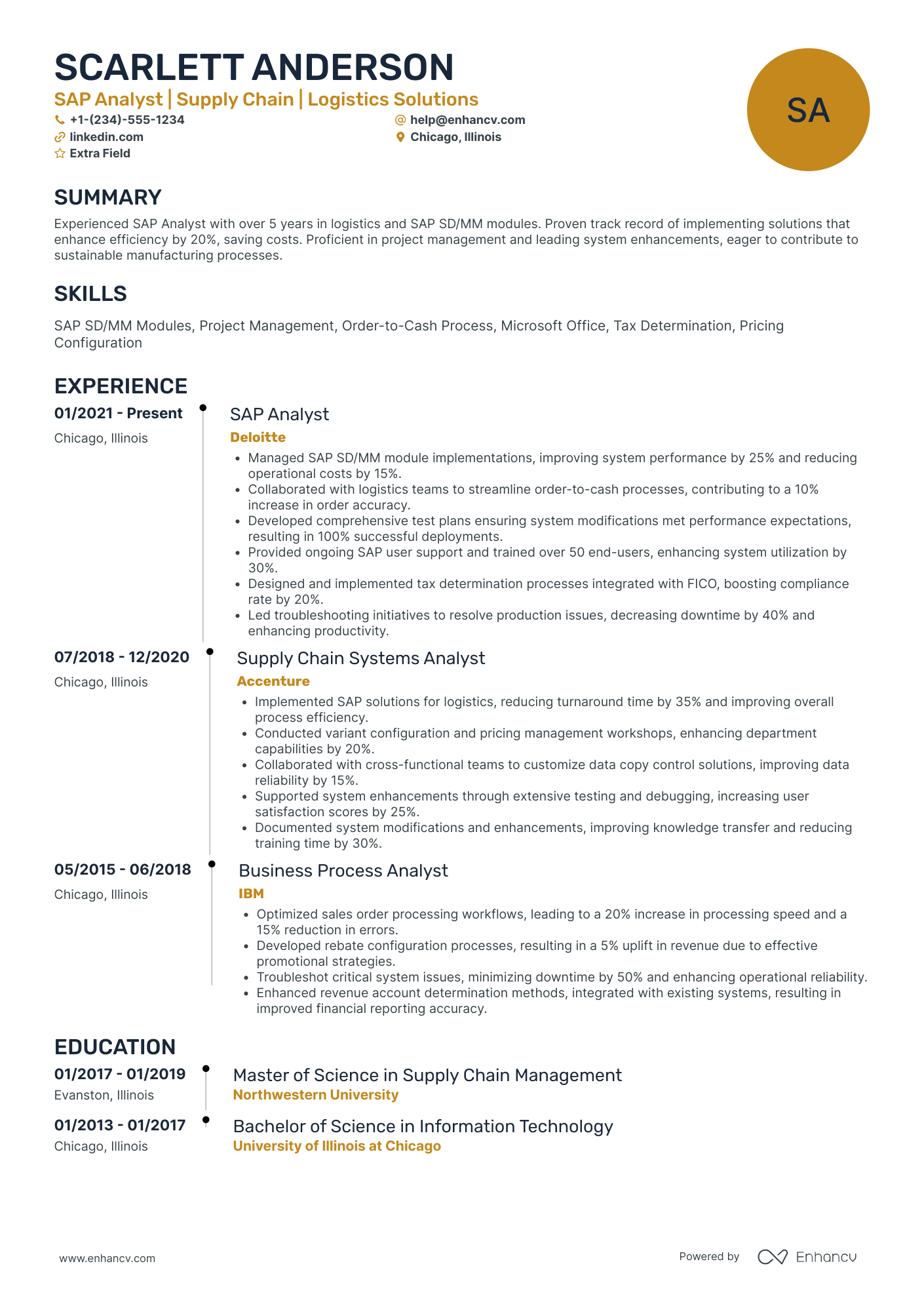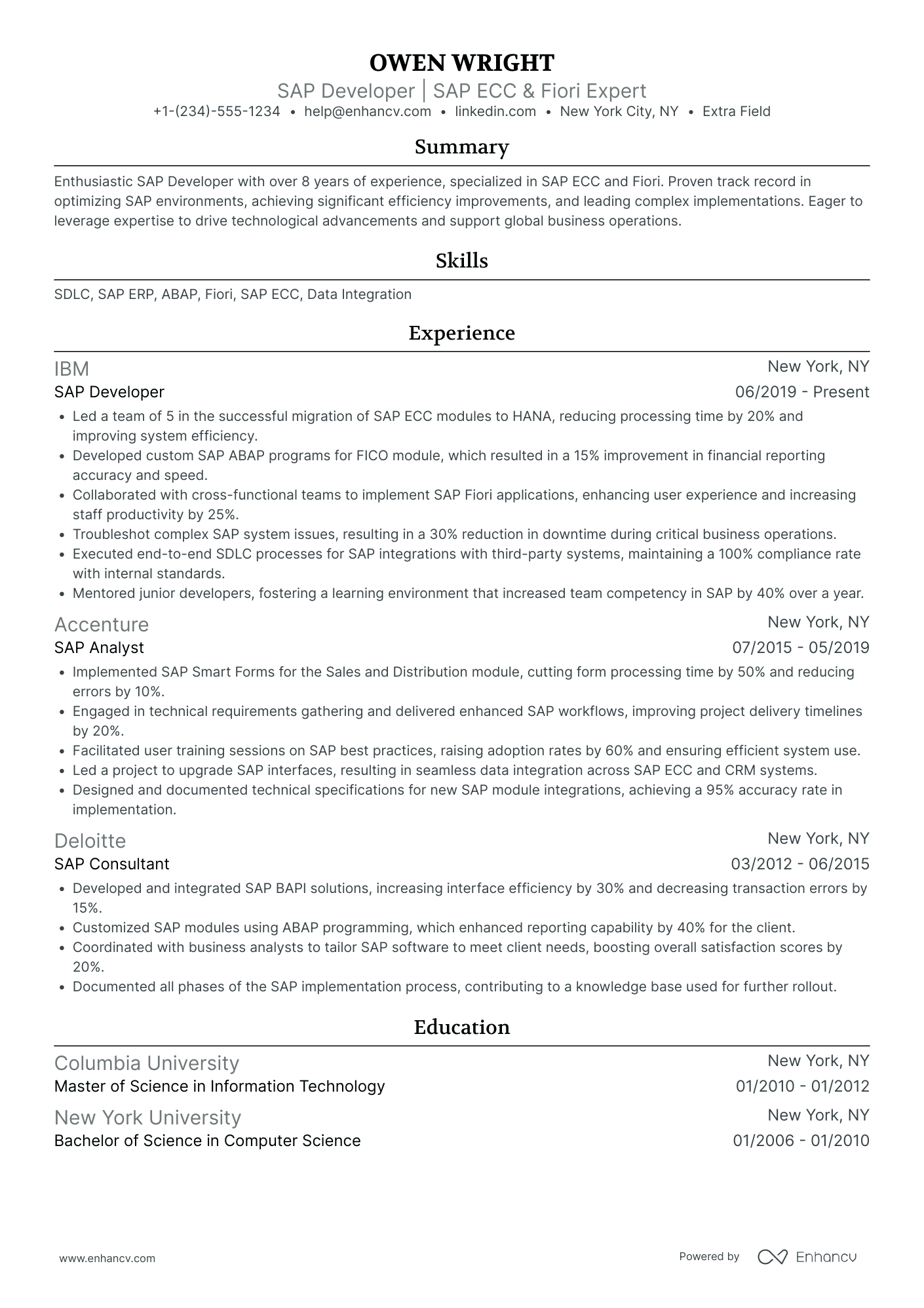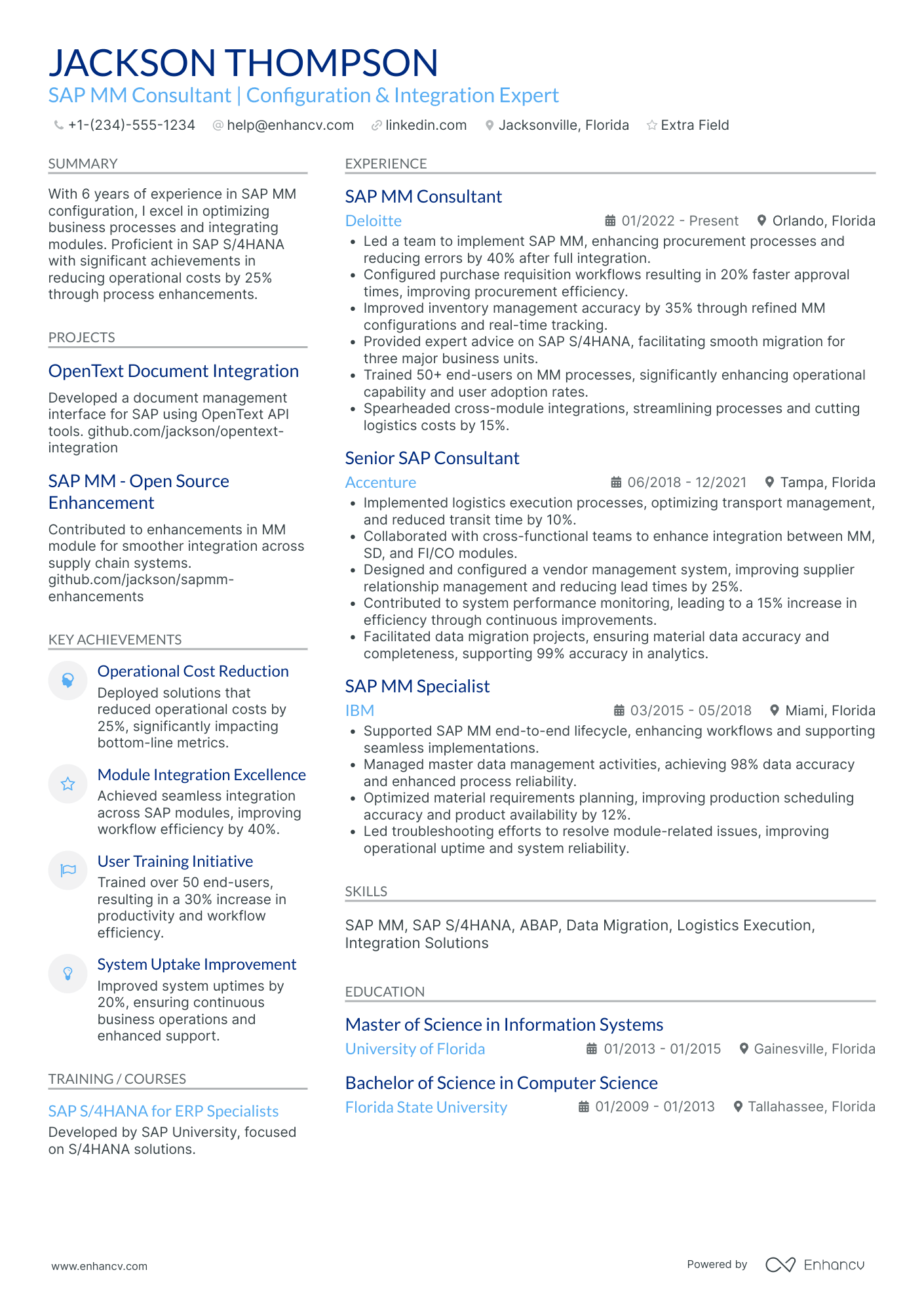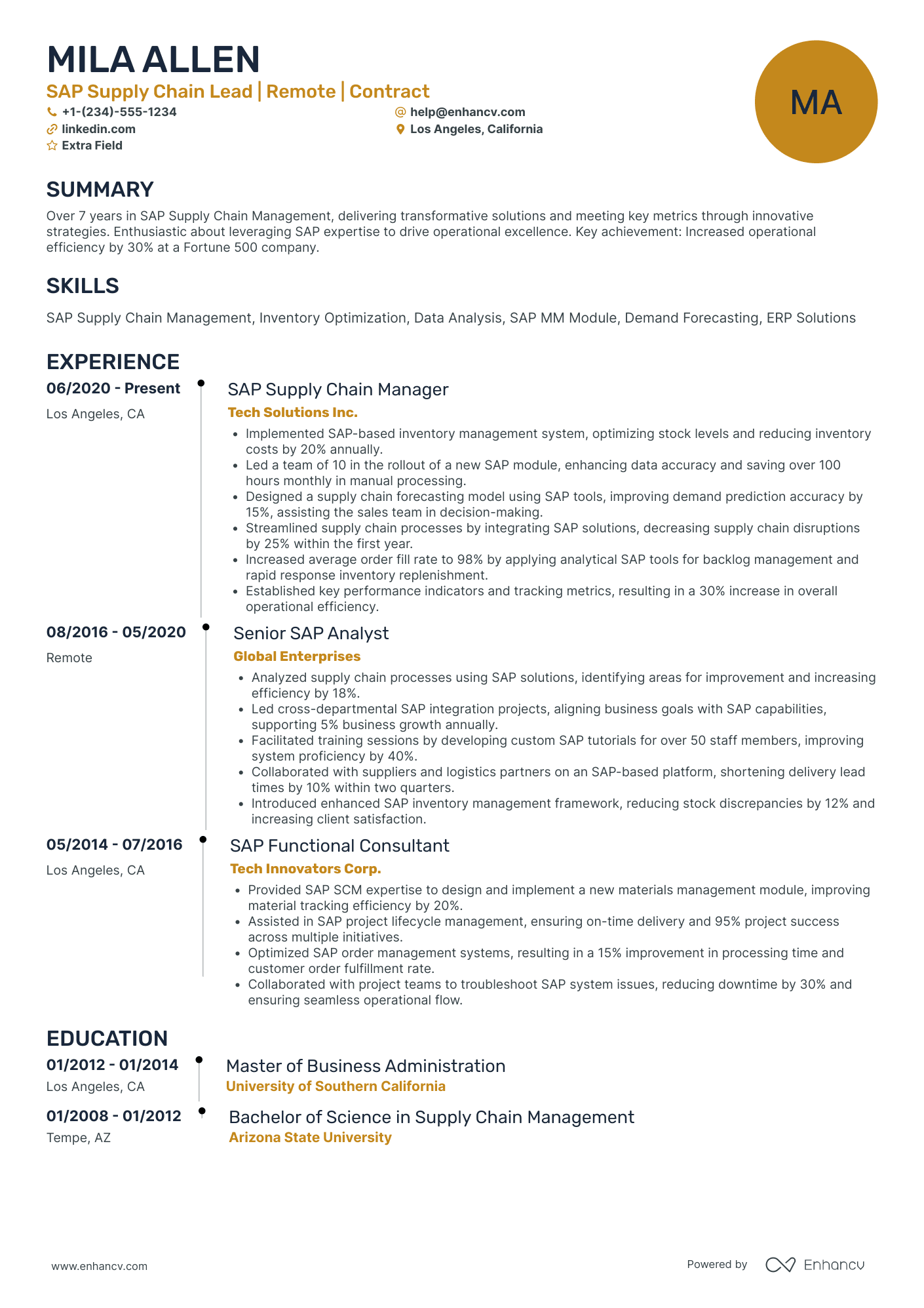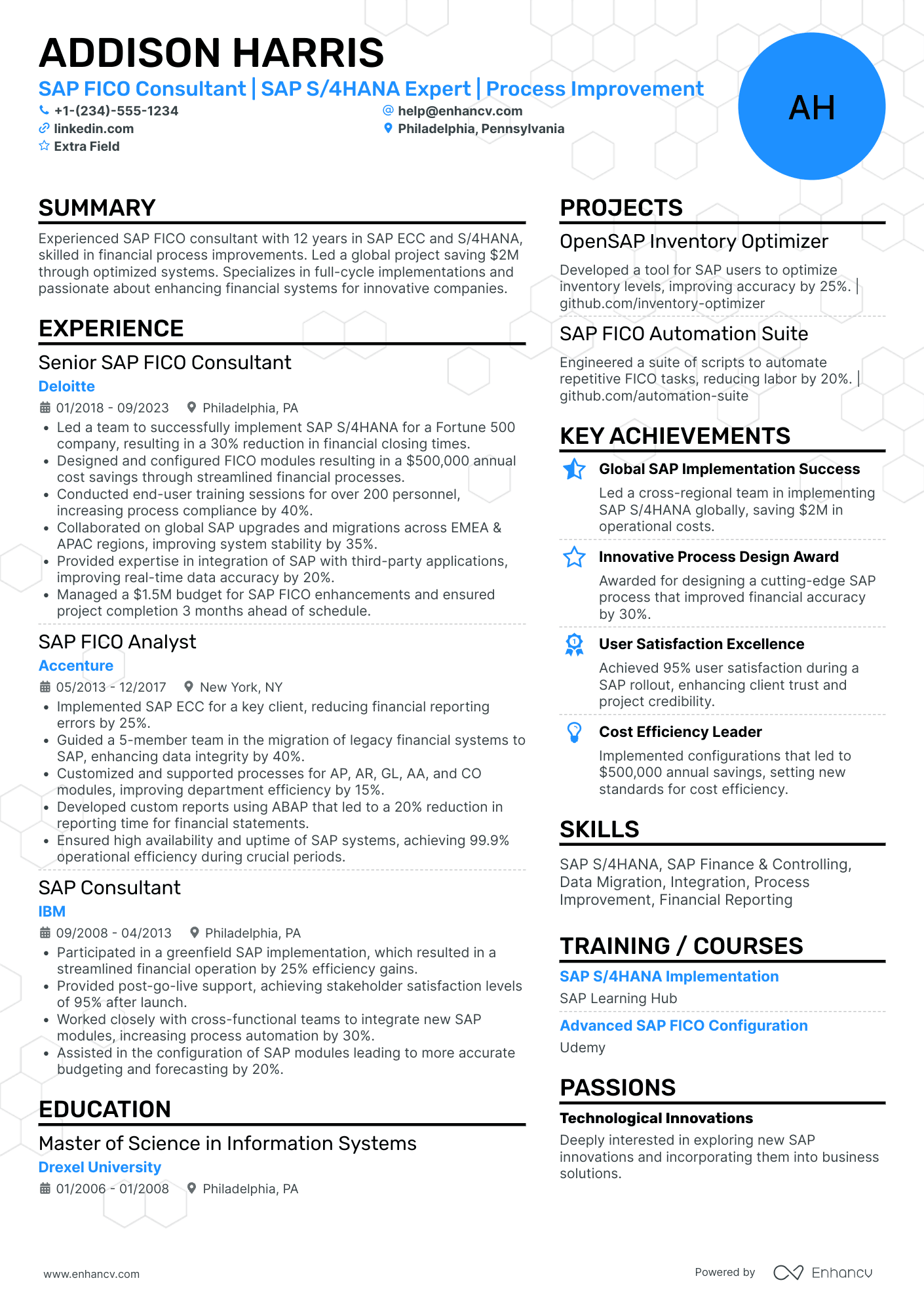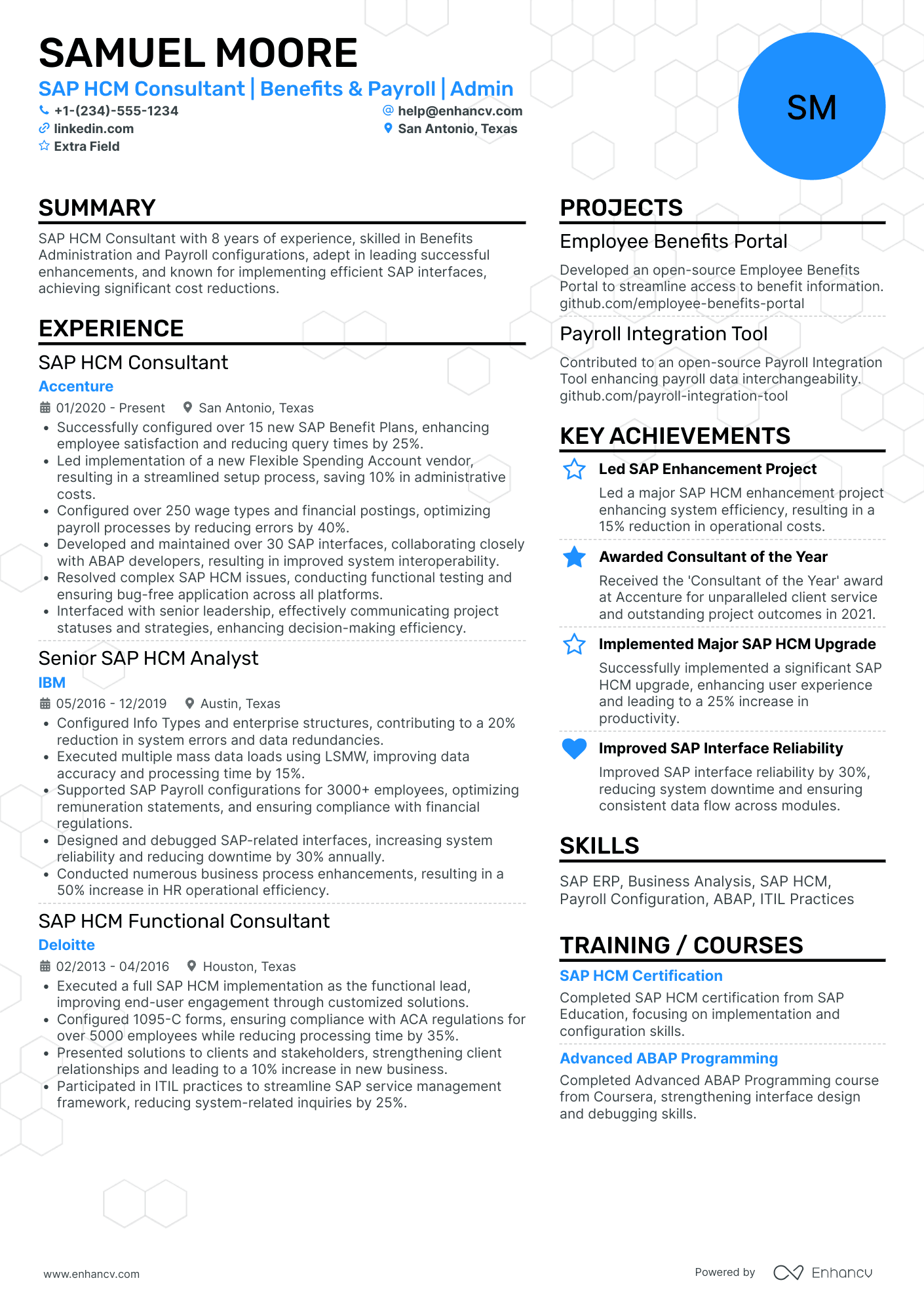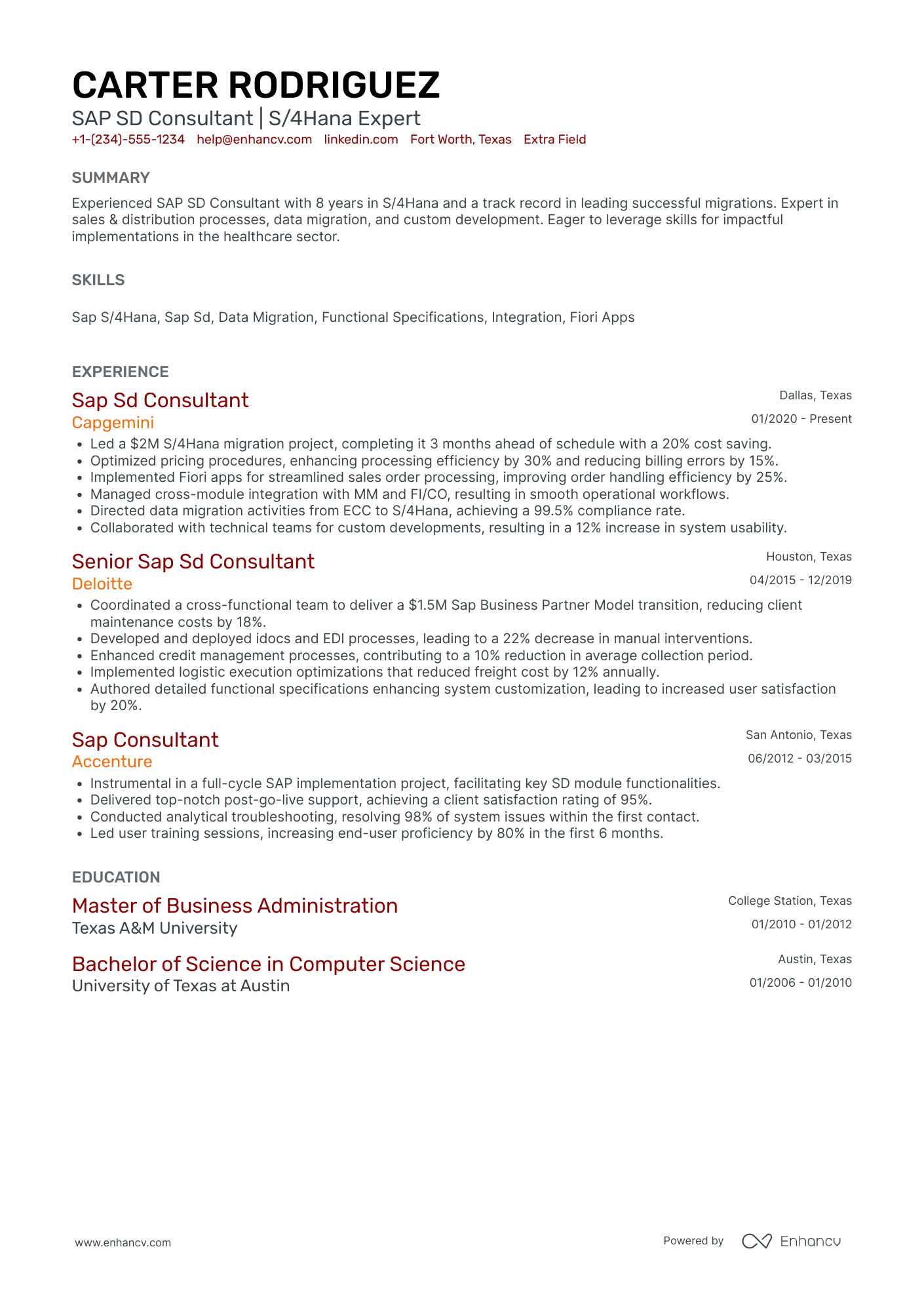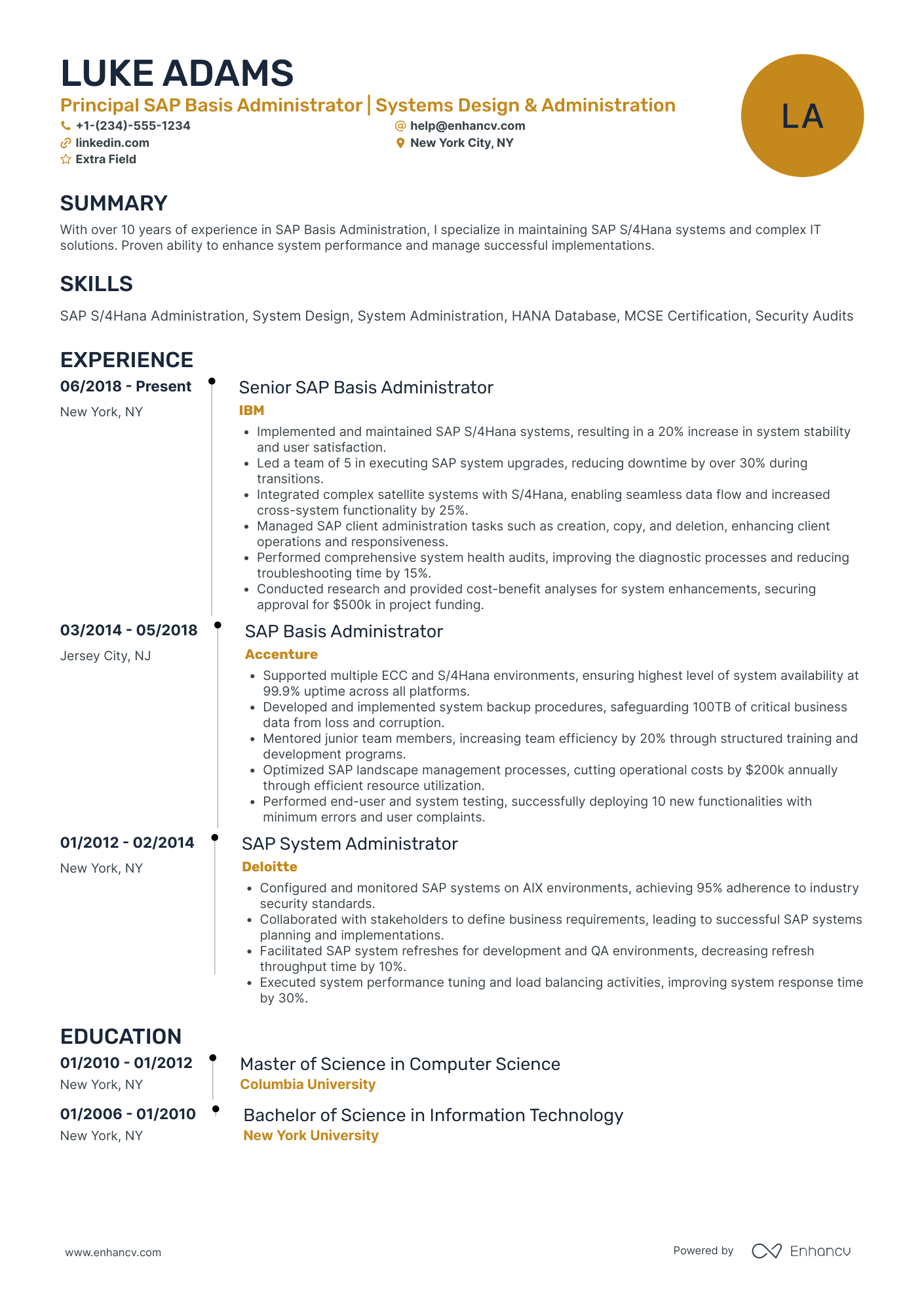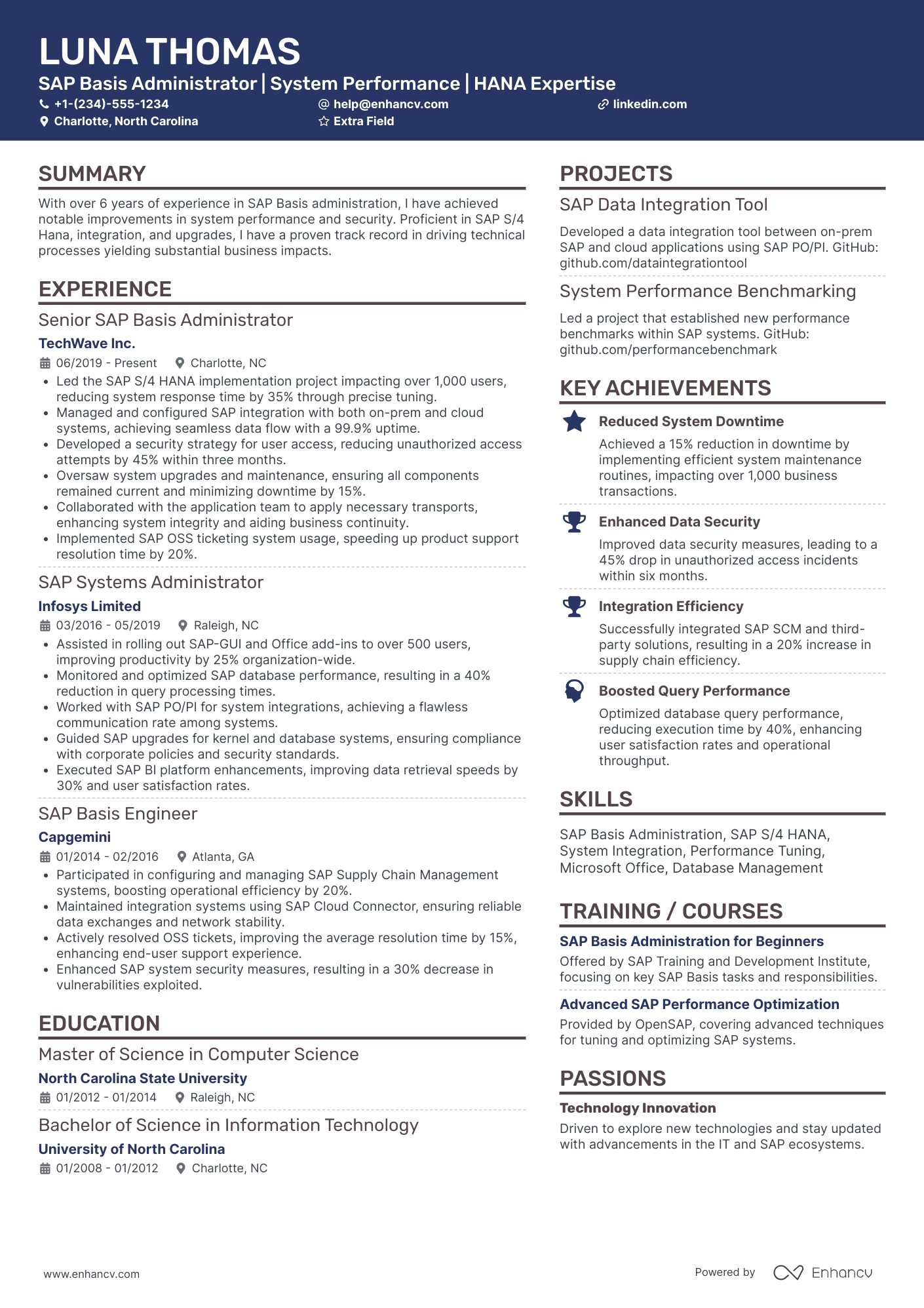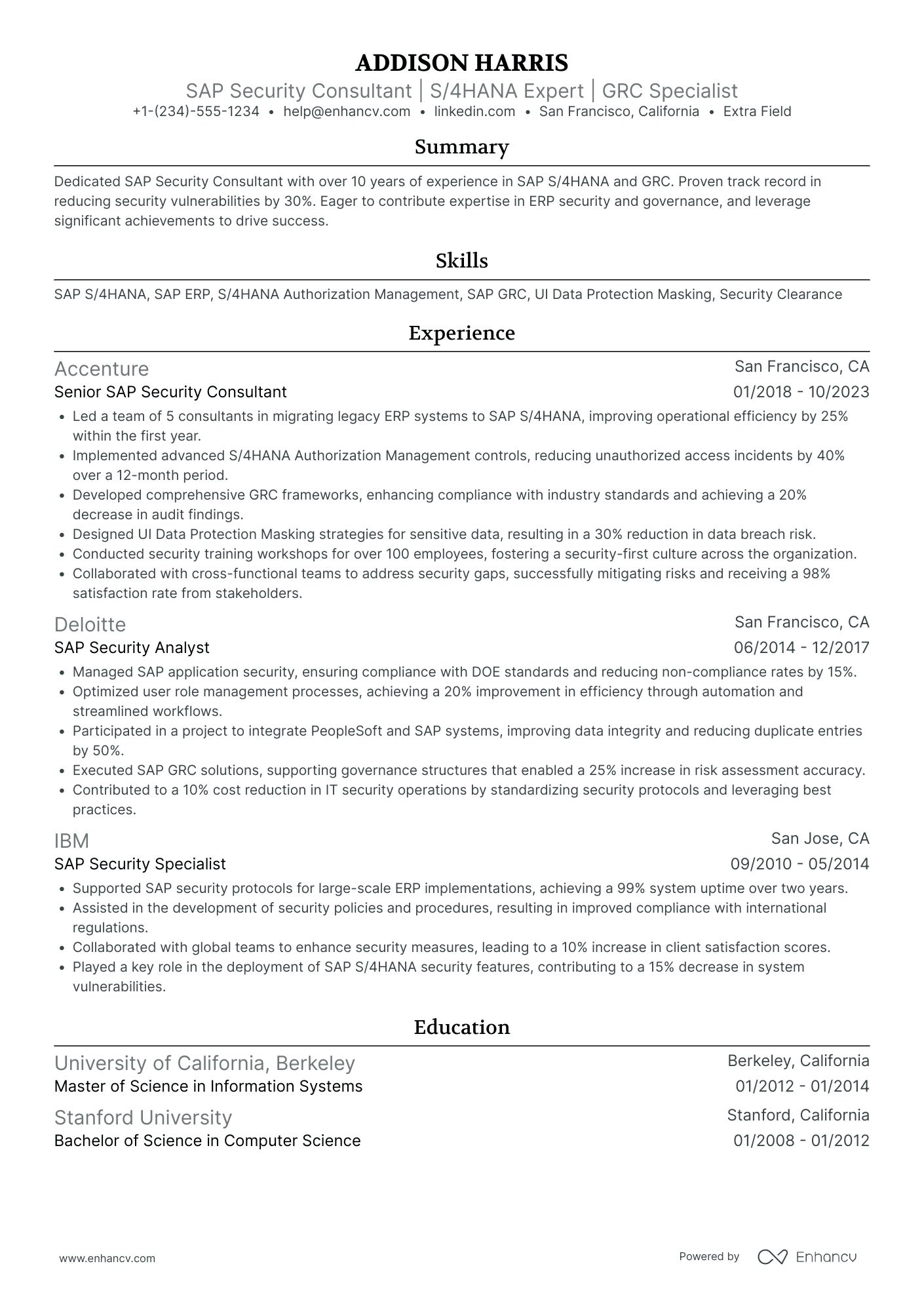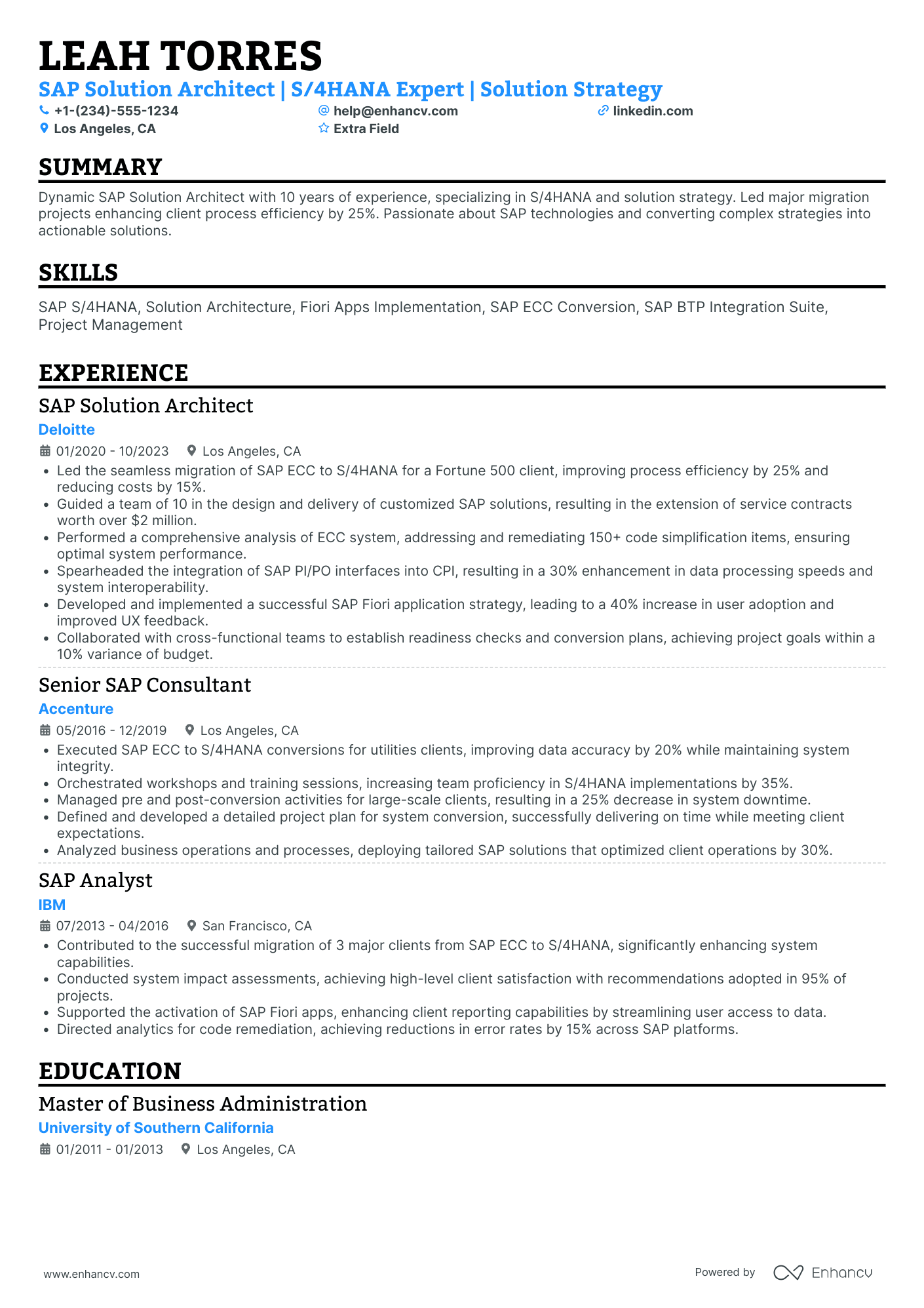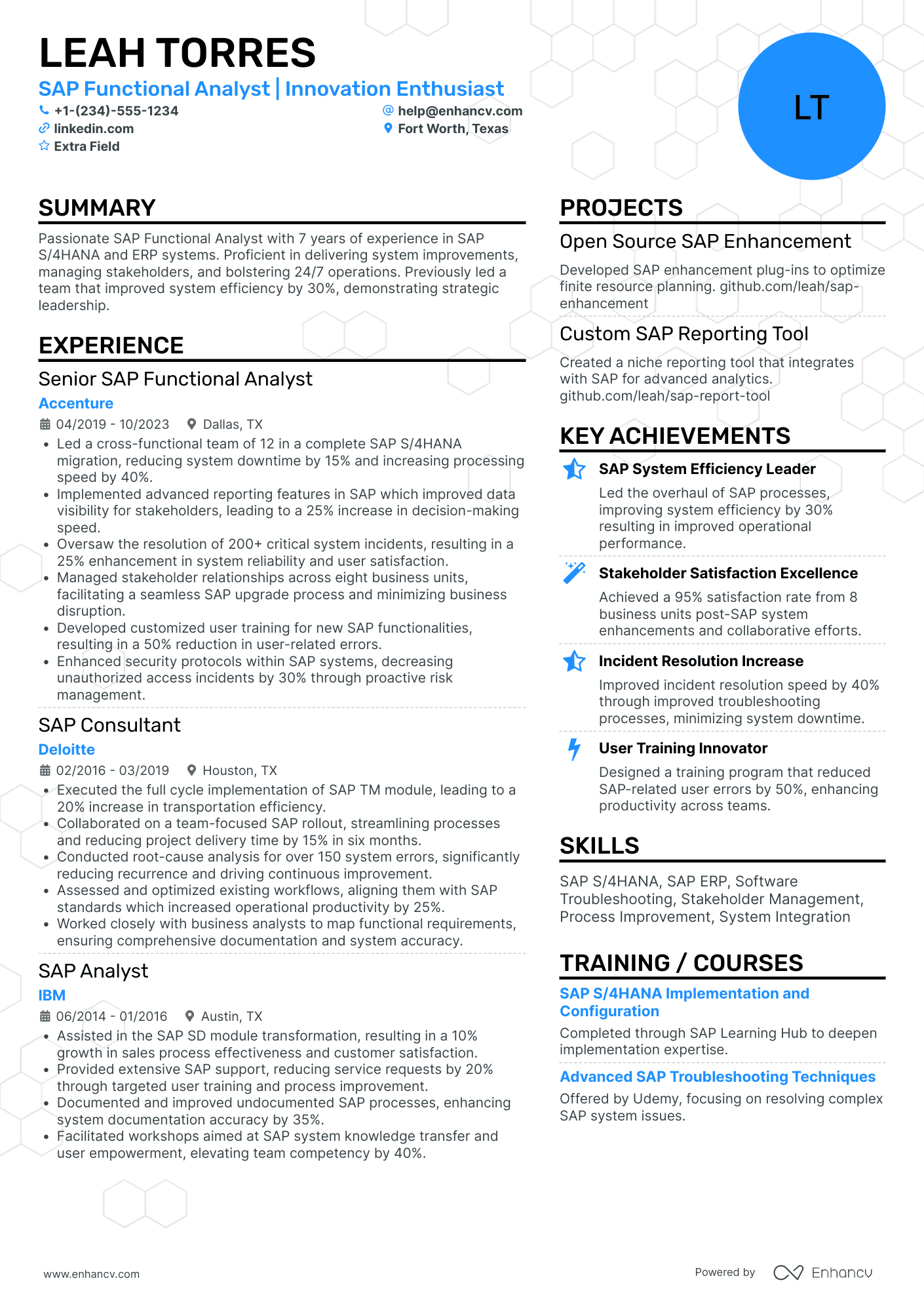When it comes to enterprise resource planning, SAP is the undisputed industry leader.
The company has evolved so much over the last 50 years. Navigating the sea of possible tech solutions it offers is becoming increasingly difficult.
But you’ve been following SAP’s development. You believe in its vision for the future of business planning. You want to help the company continue to grow.
And you know you have the skills to do it.
So, what’s stopping you from pursuing a position at SAP? Only a quality resume to impress the company’s hiring managers!
But where do you even begin?
Stating you’re a SAP consultant can be a very broad statement. The company is involved in various industries across the globe.
How can you convey the right information without getting sidetracked by the details? How do you decide which points to highlight and what to discard?
Our tips will help you stay laser-focused, so you’ll get your resume done in no time.
How?
Keep reading to find out!
Our ultimate SAP resume guide will teach you
- How to make the most out of the job descriptions and tailor your resume
- How to choose the best resume format according to your experience
- How long should your SAP resume be and why
- What you can do to boost your chances if you’ve just graduated
- Which university degrees are preferred by recruiters
- Which certifications are important for a SAP professional
- How to describe and balance out your social and technical abilities
Looking for related resumes?
- Financial Consultant
- Management Consultant
- Business Intelligence
- Strategic Planning Manager
- Java Software Developer
- Software Development Engineer
Building your SAP resume: how to select what to include
As we mentioned in the introduction, it’s easy to go off on a tangent about your work. Sometimes it’s inevitable, especially in a conversation.
Unless you’re directly speaking to a hiring manager, chances are you have to use your resume to impress.
How do you do that in under 7 seconds?
“Why 7 seconds?” you might ask.
Research shows that this is how much time hiring managers spend evaluating a single resume.
That’s why brevity and focus are the key to your Sap resume.
But how do you explain all the awesome things you’ve done without elaborating?
Recruiters are all about what you can bring to the table. As well as how your skills can help the company achieve its goals.
They’re searching for candidates whose work will promote and develop Sap.
And this is your starting point - the company’s values and vision statement.
So, how does Sap view the future? What does the company aim to achieve?
To help the world run better and improve people’s lives. Our solutions help people, businesses, and institutions achieve economic development, social progress, and environmental impact.
Already, some good points start to emerge:
- Helping people, institutions, and businesses
- Social progress
- Environmental impact
- Economic development
These are the main areas of focus for everything SAP does. All you have to do is to address them by tailoring your resume.
How?
Think of examples from your personal and professional history.
Have you ever pushed for social or economic reform in your local community? How about holding presentations on carbon emissions? Do you volunteer regularly?
Use these experiences to your advantage. Show how your career path overlaps with the company’s goals and future plans.
Need more inspiration?
Well, let’s look at the SAP values:
- How we run
- Tell it like it is
- Stay curious, embrace differences
- Keep the promise, be reliable
- Build bridges, not silos
What do these mean?
The company’s recruiters are searching for candidates who can:
- Communicate well and demonstrate expertise
- Innovate and experiment
- Continuously improve and learn
- Build relationships and be a team player
What and how you paint your experiences depends on the roles you’re pursuing. Each position will have its own requirements.
And in some cases, the job description provides role expectations and success benchmarks.
As long as you do your research, you can get a vivid idea of what to include.
But what if you have too much to share? How do you know when to stop?
In most cases, you would want to limit your resume to a single page. Remember the 7 seconds rule?
However, if you’re a tenured professional, Sap recruiters say you can stretch it to two pages. Just don’t go overboard.
What about the resume format?
Hiring managers prefer the reverse-chronological format.
Why?
Because this is the traditional format and recruiters are familiar with it. It’s easy to scan, and you know where to search for what you need.
Naturally, this layout is mostly used by specialists with a long work history. Keep in mind that most Sap job openings are targeted at people with at least 7–8 years of experience.
What if you’ve been in the workforce for only a year or two? What if you’re switching careers?
Then you should opt for the hybrid resume format. It combines the best of both worlds - skills and experience.
It gives you the opportunity to elaborate on your transferable skills. It also allows you to demonstrate how you’ve applied them in real life.
And if you’re a college grad on a quest for your first job, use the functional resume.
What is it?
This resume layout focuses on your talents and your education. If you’ve completed any internships, include them. Allow recruiters to check your references.
With so many resume formats, are there any mandatory sections you must add?
Of course, check out the table below:
Vital sections to have on your SAP resume:
- A header to list your contact information and link to important resources
- A resume objective or summary to feature your biggest accomplishments
- An experience section to demonstrate your expertise
- A skills segment to highlight your social and technical abilities
- An education and certificates box to prove you have the right qualifications
- Additional sections you can incorporate to make your resume stand out
Although it may seem like a lot, it is a simple and straightforward structure. This also means you have to be very strict on what you include on your resume.
We’ve prepared a list of questions you may be asked during an interview with SAP. Use them to guide you on what to add and info you can discard.
These will also help you prepare for the next stages of the onboarding process - the interviews.
What are hiring managers interested in knowing about you?
- Tell us about yourself. Is there anything you want to share that is not mentioned on your resume?
- Why do you want to work for SAP?
- Tell us about your short-term plans? What about long-term plans?
- Would you consider relocating for your job?
- What do you expect from your position at the company?
- How do you imagine your workday at SAP?
- What do you expect to achieve once you get hired?
- Describe a situation where you had to solve a complex issue? What happened? How was the problem resolved? What did you learn from the situation?
- Tell us about a challenge you’ve had to overcome?
- Are you familiar with DBMS? Tell us about database views and joins concept.
- Can you tell us a little bit about the core SAP modules?
- Describe your strengths.
- What is your biggest weakness?
The SAP resume header: getting off on the right foot
If you think the resume header is just a filler section, think again. It may be a bit inconspicuous, yet this is the first impression you give recruiters.
What should the resume header contain? Your:
- Name
- Address
- Job title or preferred job title
- Phone number
- Links to portfolio and/or relevant social profiles (LinkedIn, Kaggle, GitHub, etc.)\
Make sure your social accounts are relevant to the position you’re applying to.
If you’re a Software Developer, it would make more sense to have your GitHub listed. And not your LinkedIn.
Also, keep an eye out for any:
- Typos
- Missing information
- Broken links
- Not enough communication methods listed
- Unnecessary abbreviations
Obviously, no one wants typos on their resume. But it happens. Sometimes even in the first section.
Compare the samples below. Notice how small changes make big differences in perception.
3 SAP resume header examples
Here is what not do with your resume header:
What’s wrong here?
First, the candidate’s name is abbreviated. Unless you’re a celebrity in your field and your name is recognizable, don’t shorten it.
Secondly, Yang’s job title is not specific enough. If you want to grab recruiters’ attention, indicate your:
- Specialization
- Level of expertise
Next, while some SAP roles are remote, not every position is. Hiring managers need to know where you’re located for legal purposes.
Finally, Yang hasn’t linked to any relevant resources to showcase her work.
Want to see a better version? Have a look at the sample below:
What a difference!
Starting with the job title - Yang’s experience stands out. And in a good way. Just from the job title, we can grasp that she is:
- A SAP financial specialist
- Someone who has been in the industry enough to be a senior expert
- Also, knowledgeable about risk and compliance
Recruiters will definitely want to know more about her!
Another good edit of Yang’s resume header would be:
The make-or-break section: your SAP resume summary
Woah!
A make-or-break section sounds serious. What’s so important about the resume summary?
Consider this your elevator pitch. It’s a short paragraph of 4–5 sentences, in which you:
- Succinctly review your expertise
- Lay out your best achievements
- Point to relevant and interesting facts that don’t fit in any other category
What if you don’t have much experience?
Then you should write a resume objective. Is it any different from the summary? Only in its focus.
If you lack experience, concentrate on how your skills will be applied should you get hired. Link them to SAP’s vision and future goals.
This shows you’ve done your homework and really want the offered role.
Optimize your resume summary and objective for ATS
Drop your resume here or choose a file.
PDF & DOCX only. Max 2MB file size.
3 SAP resume summary examples
Take a look at the following sample:
{ "record": "SummarySection", "name": "", "items": [ { "record": "SummaryItem", "text": "University of Pennsylvania graduate, class of 2017, who wants a position with SAP. Highly-motivated, good communicator with a results-oriented mindset. Knowledgeable about SAP S/4HANA." } ], "showTitle": true }
Doesn’t sound inspiring, does it? While this is a somewhat normal first draft, it definitely isn’t a resume-ready section.
Why?
Because there are too many mistakes. The applicant:
- Unnecessarily indicates the graduation year
- Hasn’t specified their degree
- Makes no mention of preferred job roles
- Relies on adjectives instead of experience to stand out
- Hasn’t addressed the company’s aims, yet has listed industry-related jargon as a filling
This first mistake makes the resume look dodgy. Assuming the resume objective was written in 2022, why even mention the graduation year?
Moreover, hiring managers may wonder if the applicant was unable to secure a job. And 5 years is a long time in the corporate world.
Let’s enhance the draft:
Not only do we get details about the candidate here. But there’s also a lot of information about their attitude towards the industry.
The self-starter mindset and drive are clearly visible. The applicant is:
- Willing to learn new things
- Involves themselves in relevant extracurricular activities
- Familiar with the SAP jargon and the certification process
This is someone who’s definitely done their homework on the company. And someone very determined to get a position at SAP.
Here is another example of how you can make a splash:
Remember the bit about proud moments which cannot be fitted in a specific category?
This is the perfect example of such a case.
Anyone in cybersecurity knows what DEFCON is. More importantly, they know what it means to hold a Black Badge.
Trust us, if you’re applying for a cybersecurity role, this is the only credential you’ll need.
So, if you have other similar achievements, put them in the resume summary.
How to get the most out of the experience section
Given that most of SAP’s available positions are for experienced professionals, you must step up your game.
But how do you outshine other candidates?
Easy!
There are three factors you must take into account:
- The keywords in the job description
- Finding relevant examples from your work experience
- Presenting achievements which directly address SAP’s goals
Once you have all these in place, follow the C-A-R method. This mnemonic will help you structure your experience entries. It stands for Challenge-Action-Result.
Achievements are good. But if you put them in context and showcase the outcome, they leave a lasting impression.
Don’t forget to keep the entries brief - between 3-5 bullet points. And always lead with data.
Let’s review a few samples to get a better idea of the method.
3 SAP resume experience examples
Avoid entries such as this:
- •helped companies merge
- •compliance regulations in emerging markets
- •SAP Analytics Cloud
A few minor mistakes stand out. For example, the job title can be more specific. The company description isn’t descriptive. And there’s no link to the firm’s website.
The formatting for the address and the dates of employment needs to be fixed.
Yet, what is most noticeable about this experience section is the laundry list of duties. Recruiters are familiar with the job descriptions for most of the industry roles.
This isn’t enough to get yourself on anyone’s radar. Let alone being considered for a SAP position.
How can it be improved? Check out the sample entry below:
- •Reduced report time by 70% after implementing new tools and methods for data processing.
- •Successfully migrated the company's datasets to SAP S/4HANA, thus improving information lifecycle and increasing security by 62%.
- •Onboarded 20 new clients by preventing three major cyberattacks, which aimed to deface existing clients' websites and steal customer and employee data.
Which company wouldn’t want to do their work in half the time? Or attract more clients?
From a business perspective, these are great results. Anyone who can bring such experience on board is a perfect SAP candidate.
Need another sample? Have a look at the following experience section:
- •Facilitated the successful merger between ABC and XYZ companies by assembling a team of experts, dealing with all aspects of the process.
- •Boosted the overall revenue by 84% for 5 clients by leveraging knowledge about government and compliance regulations in emerging markets.
- •Tripled the value of the company's financial reporting by utilizing the SAP Analytics Cloud and SAP S/4HANA Cloud machine learning, analysis and predictive models.
How to get noticed by SAP hiring managers for your skills
Undoubtedly, SAP professionals are very talented. They need to possess an array of abilities to do their job properly.
But which are more important - hard skills or soft skills?
The truth is, both. Building relationships is just as important as being able to migrate to SAP S/4HANA from the old SAP ECC.
While one kind may outweigh the other due to your specific work, both matter. And you need to create a nice balance between the two.
After you fill out the skills section, check if you’ve unintentionally given preference to one type over the other.
If so, review the section again and see which ones can be swapped for a better alternative.
Recruiters love a well-rounded candidate - show them how unique you are!
What to keep in mind when describing your hard skills
Regardless of the field you operate in, if you’re a SAP specialist, tech skills are important. Make sure that you know what you’re talking about.
If you don’t have much experience, list any related training you’ve completed. Even if it’s just the SAP Fundamentals course.
You may have to go through a few technical interviews before you get the job.
So if you’re a developer, list only languages and tools you’re comfortable being tested in.
With that being said, what are the trendiest tech abilities for SAP employees?
Top hard skills for SAP principal finance consultant:
- Business Intelligence
- BI Security
- Risk analysis
- Analytical skills
- Business acumen
- Master Data
- IDoc
- EDI
- ALE
- XSD
- XML WSDL
- Workflow
- ECC
- ERP
Crucial technical talents for SAP human resources specialists:
- HRMS
- HCM
- PMS
- QMS
- QEHS
- SAP Success Factors HXM Suite
- SAP Business Technology Platform
- HRIS
- LMS
- SAP Analytics Cloud
- Workforce Analytics
- Performance and Goals
- Opportunity Marketplace
- SAP Enterprise Support
Essential hard skills for SAP development & technology experts:
- ABAP
- Java
- Python
- C
- SQL
- .Net
- PHP
- OOPS
- Test scripts
- SAP LSMW
- SAP S4/HANA
- ITGC
- GRC
- User Exit
- Prototyping
- Roadmapping
- Reading blueprints
- SAP Products
How to outshine the competition with your social skills
Soft skills are notoriously difficult to assess. But that’s because many don’t stop to consider the impact of their work.
For example, how do you prove you’re a team player?
- You’ve mentored someone on how to complete a complex procedure
- You’ve helped a colleague resole a tough issue
- You’ve had to cover for another employee who was sick and unable to work
There are so many ways you can feature your soft skills. All you need is your experience and the C-A-R method:
Who knew you could quantify your social talents?
We did. And you do, too!
Remember, always provide context and data.
We’ve gathered some inspiration for you. Here are the most popular soft skills for SAP experts:
Key soft skills to have on your SAP resume:
- Ambitious
- Dreamers
- Dynamic
- Adaptable
- Collaborative
- Creative
- Fun
- Strategic
- Thoughtful
- Communication skills
- Trustworthy
- Accountable
- Responsible
- Transparent
- Empathetic
- Passionate
- Self-starter
- Familiar with industry standards
- Problem-solving
- Conflict resolution
- Incident management
- Personable
- Interpersonal skills
- Friendly
- Team work
- Leadership skills
- People management skills
- Relationship building
- Negotiation skills
- Inventory management
- Accounting
- Budgeting skills
- Ability to explain complex concepts
- Thought leadership
- Flexibility
- Integrity
- Mentorship skills
- Agile
- Ability to present
What degrees do SAP hiring managers prefer?
Don’t underestimate the education section on your resume. Even if you’re an experienced professional.
There is no way around not having a formal education. All SAP roles demand a Bachelor’s degree as a minimum requirement.
So which degrees are most common among SAP staff?
- Bachelor of Business Administration (BBA)
- Bachelor of Business
- BA Accounting and Finance
- BA Human Resource Management
- BSc Computer Science
- BSc Software Development
- MSc MCA
- BSc Electrical Engineering
- BSc Energy Management
- BSc Petroleum and Natural Gas Engineering
- BSc Surveying Engineering
And many, many more.
As long as your degree is relevant to the role you’ve chosen, that’s all that matters.
How important are certificates on your SAP resume?
Very!
It’s almost impossible to be a SAP expert without undergoing training and certification. The company offers more than 50 different specializations.
Depending on the learning path you’ve chosen, you can become a certified:
- Consultant
- Developer
- Architect
- Administrator
- Business user
- Data analyst
Bear in mind that the certificates have an expiry date. SAP regularly updates the certificates’ validity on its website. So check it before you add anything to your resume.
Trending certificates for your SAP resume:
- SAP Activate Project Manager
- SAP Activate for Cloud Solutions Project Manager
- SAP BusinessObjects Business Intelligence Platform 4.2
- SAP Reporting, Modeling, and Data Acquisition (SAP BW/4HANA 2.x)
- Data Integration with SAP Data Services 4.2
- SAP S/4HANA for Management Accounting Associates (SAP S/4HANA 1909)
- SAP S/4HANA for Financial Accounting Associates (SAP S/4HANA 1909)
- SAP S/4HANA Sourcing and Procurement
- SAP S/4HANA Sales
- SAP Business ByDesign
- SAP Commerce - Certified Product Support Specialist
- SAP System Security Architect
- SAP BW/4HANA 2.0 Delta
- SAP HANA
- SAP HANA 2.0 (SPS04)
- SAP Cloud Platform Integration
- SAP Solution Manager, Mandatory and Managed System Configuration
- SAP Fiori Application Developer
- SAP Certified Development Specialist - ABAP for SAP HANA 2.0
- SAP S/4Hana (NetWeaver ABAP Programmer)
Are there any other sections you can include on your SAP resume?
Of course, you can!
If you have some real estate left on your resume, you can fill it with:
- Academic awards and projects
- Side gigs and notable projects
- Internships
- Conference talks and presentations
- References to leadership positions at relevant associations
- Hackathons
- Industry and business blogs
- Publications and articles
The list is long. But make an effort not to overcrowd your resume.
Hiring managers don’t have much time to spend on individual candidates.
Unless they are the perfect fit.
Key takeaways: paving your way to a SAP consulting career
- Read the job descriptions carefully and make note of important keywords
- Research the company values and mission statement. Address them throughout your resume.
- Learn about SAP’s core modules. If possible, reference them by sharing your own experience.
- Stick to a maximum of two pages when writing your resume
- Provide data, context and results to each of your experience section entries
- Any internship or hackathon experience must be included
- Present a well-rounded balanced skills section
- List any relevant SAP certificates you hold
SAP resume examples
By Experience
By Role
